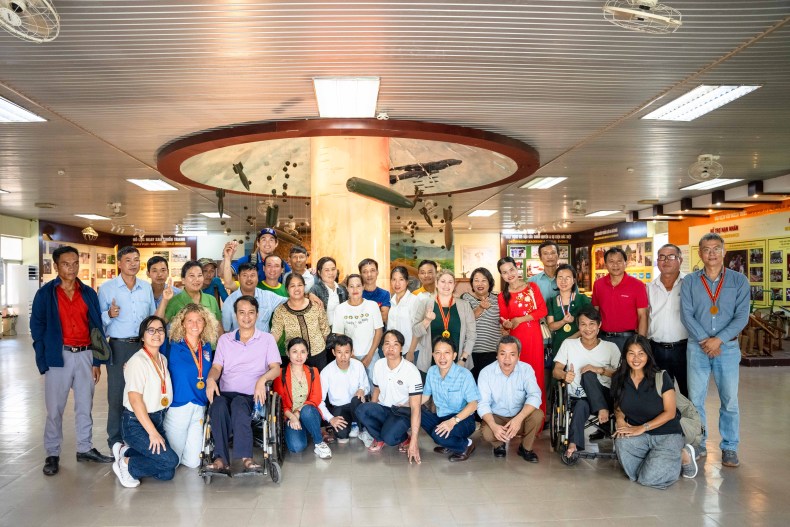Posted on November 13, 2023 View all News
Sports Envoys and the US Mission in Vietnam delegation pose for a group photo with Quang Tri athletes with disabilities.
Dong Ha, Quang Tri (13 November 2023) — A group of 25 athletes with disabilities from Dakrong, Cam Lo, Dong Ha, Trieu Phong, and Vinh Linh districts of Quang Tri Province on Saturday took part in a talk on “Sports – The Bridge of Community Integration” for persons with disabilities, with two special Sports Envoys from the United States.
This inspiring event at the Mine Action Visitor Center resulted from coordination between the U.S. Mission in Vietnam, National Paralympic Committee, Project RENEW and Quang Tri Department of Culture, Sports and Tourism.
Cultural Affairs Officer Kate Bartlett introduces two Sports Envoys from the U.S. to the local athletes with disabilities.
U.S. Embassy Cultural Affairs Officer Kate Bartlett, who led the delegation, said that the U.S. government has invested around $155 million over the past couple of decades of support to improve the lives of more than one million people with disabilities. “The Embassy recently has focused more on the field of sports and the importance of promoting social inclusion as a bridge for persons with disabilities to fully integrate in society,” said Bartlett. “A lot of time and energy are put on social inclusion, accessibility and working with the government on changes in policy.”
During the talk, two U.S. Sports Envoys, Rudy Garcia-Tolson and Julia Harbaugh, shared with 25 athletes with disabilities of Quang Tri Province their own experience in overcoming challenges to become international contenders and integrate into their communities, as well as promoting social inclusion through sports, and psychological support for athletes with disabilities when doing sports.
Athlete with disabilities Tran Hoan from Dong Ha performs using his arms while the U.S. Mission in Vietnam and other athletes clap their hands.
A swimmer, runner, and triathlete from California, Rudy Garcia-Tolson was born with a rare disability. As a five-year-old wheelchair user, after 15 operations, Tolson decided he would rather be a double amputee and walk with prosthetics. Tolson started swimming at age six. He won the gold medal in the 200-meter individual medley and broke the world record in the 2004 Paralympic Games. He again won the gold medal in the 2008 Beijing Paralympics, and the silver medal in the 2012 London Paralympics.
Tolson got his first pair of prosthetics when he was very young. One of the greatest barriers, when he started doing sports, was people around him not thinking that he could do some of the same things that others without disabilities were doing.
Even though people referred to him as the boy with no legs, Tolson was just trying to keep up with everybody else. “That was one of a lot of ways for me to stay motivated to prove they were wrong,” Tolson said. “We were born from disability or acquired a disability. So we know what it’s like for others to tell us that we can’t do certain things, for people to make fun of us. So I think we all share that common bond of overcoming our disabilities and still living life to the fullest.”
Le Thi Hoai Phuong, a survivor of unexploded ordnance, an athlete with disabilities from Vinh Linh, gives Rudy Garcia-Tolson a pin during the talk.
Starting doing sports ten years after losing her leg in a post-war ordnance accident in 1993, 47-year-old Le Thi Hoai Phuong from Vinh Linh expressed admiration for Rudy Garcia-Tolson. “I agree with Mr. Tolson that engaging in sports helps persons with disablities like me overcome our lack of confidence,” said the mother of two. “It is important that engaging in sports keep us fit and encourages us to socially integrate.”
According to Le Xuan Hong, Deputy Director of Provincial Sport Competition and Training Center, and coach of atheletes with disabilities, Quang Tri Province has always been in the Top 5 rankings in Viet Nam’s national and regional Paralympics.
Julia Harbough, a swimming coach from California and advocate for underserved communities in sports and technology, said it’s so important not to separate athletes with disabilities and those without disabilities because they can learn so much from one another. Harbaugh often works with athletes that complete marathons faster than she does, so she learns to be a better runner by running alongside them.
“Not only does it allow me to be a change maker in my community to help support the next generation, especially as someone who works in technology,” said Harbaugh. ” But also it helps us get grants from private funders in order to raise significant funds in my own community.”
12 total views, 12 views today

